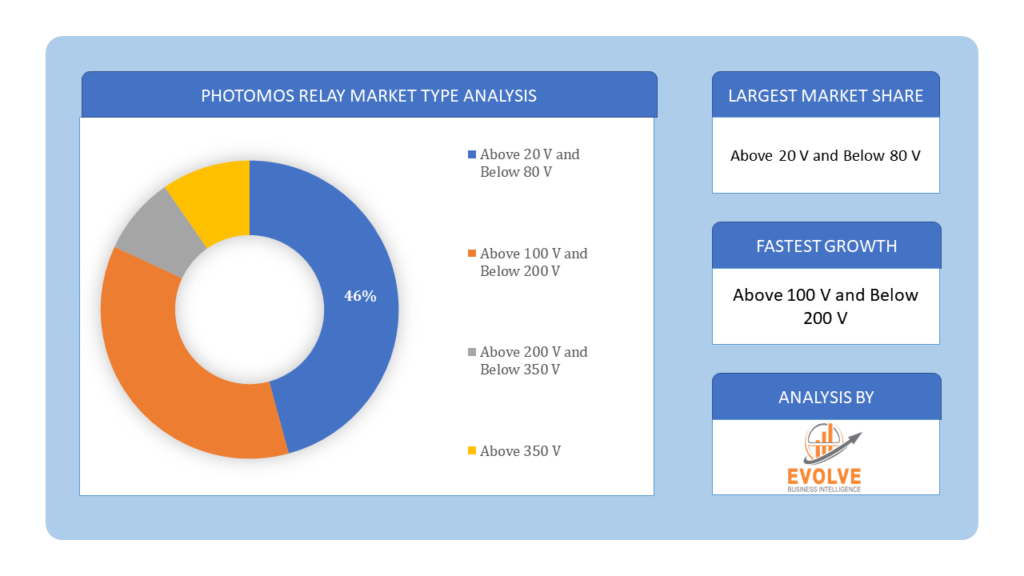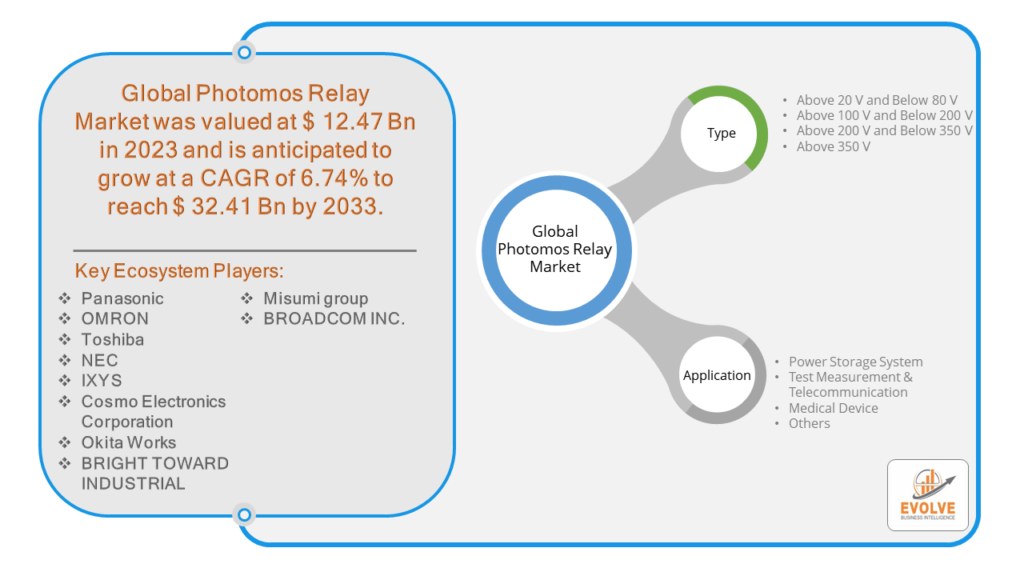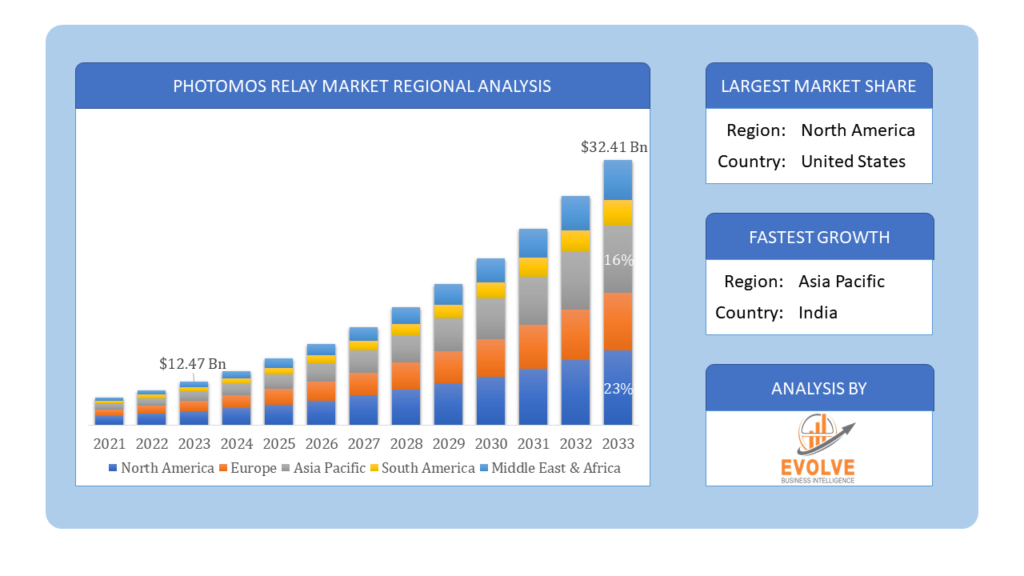Photomos Relay Market Analysis and Global Forecast 2023-2033
$ 1,390.00 – $ 5,520.00Price range: $ 1,390.00 through $ 5,520.00
Photomos Relay Market Research Report: Information By Type (Above 20 V and Below 80 V, Above 100 V and Below 200 V, Above 200 V and Below 350 V, Above 350 V), By Application (Power Storage System, Test Measurement & Telecommunication, Medical Device, Others), and by Region — Forecast till 2033
Page: 100
Photomos Relay Market Overview
The Photomos Relay Market Size is expected to reach USD 32.41 Billion by 2033. The Photomos Relay industry size accounted for USD 12.47 Billion in 2023 and is expected to expand at a compound annual growth rate (CAGR) of 6.74% from 2023 to 2033. The Photomos Relay Market refers to the industry segment focused on the production and distribution of photomos relays, which are solid-state relays that utilize a combination of photo-sensitive MOSFETs and LEDs to switch electrical signals. These relays are known for their high reliability, long operational life, and low power consumption compared to traditional mechanical relays. They are widely used in various applications, including telecommunications, automotive, industrial automation, and consumer electronics. The market is driven by increasing demand for miniaturization, energy-efficient components, and advancements in semiconductor technologies.
Global Photomos Relay Market Synopsis
The COVID-19 pandemic has led to supply chain disruptions leading to supply shortages or lower demand in the Photomos Relay market. The travel restrictions and social-distancing measures have resulted in a sharp drop in consumer and business spending and this pattern is to continue for some time. The end-user trend and preferences have changed due to the pandemic and have resulted in manufacturers, developers, and service providers to adopt various strategies to stabilize the company.
Photomos Relay Market Dynamics
The major factors that have impacted the growth of Photomos Relay are as follows:
Drivers:
Ø Increased Adoption in Automotive Electronics
The automotive industry is rapidly incorporating more electronic components for various functions such as advanced driver-assistance systems (ADAS), infotainment systems, and electric vehicle (EV) power management. Photomos relays are favored in this sector due to their high switching speeds, reliability, and compact size. The push towards electric and hybrid vehicles further fuels the demand for efficient and reliable electronic components like photomos relays.
Restraint:
- High Initial Costs
One of the significant restraints in the Photomos Relay Market is the relatively high initial cost compared to traditional electromechanical relays. The advanced technology and materials used in manufacturing photomos relays contribute to their higher price point. This cost factor can be a barrier for small and medium-sized enterprises (SMEs) or industries with tight budget constraints, limiting widespread adoption.
Opportunity:
⮚ Electrification of Transportation
The electrification of transportation, including electric vehicles (EVs), railways, and aviation, is a major growth area for photomos relays. These relays are used in various electronic systems within EVs, such as battery management, charging systems, and power inverters. The global push towards reducing carbon emissions and adopting electric transportation solutions will boost the demand for photomos relays in this sector.
Photomos Relay Segment Overview
By Type
 Based on Type,the market is segmented based on Above 20 V and Below 80 V, Above 100 V and Below 200 V, Above 200 V and Below 350 V, Above 350 V. The Above 100 V and Below 200 V segment dominates the market due to its broad applicability in various industrial, automotive, and telecommunications applications, where moderate voltage levels are commonly required.
Based on Type,the market is segmented based on Above 20 V and Below 80 V, Above 100 V and Below 200 V, Above 200 V and Below 350 V, Above 350 V. The Above 100 V and Below 200 V segment dominates the market due to its broad applicability in various industrial, automotive, and telecommunications applications, where moderate voltage levels are commonly required.
By Application
Based on Applications, the market has been divided into the Power Storage System, Test Measurement & Telecommunication, Medical Device, Others. The Test Measurement & Telecommunication segment dominates the market due to the critical need for reliable, high-performance switching solutions in rapidly expanding and technologically advanced communication networks.
Global Photomos Relay Market Regional Analysis
Based on region, the global Photomos Relay market has been divided into North America, Europe, Asia-Pacific, the Middle East & Africa, and Latin America. North America is projected to dominate the use of the Photomos Relay market followed by the Asia-Pacific and Europe regions.
 Photomos Relay North America Market
Photomos Relay North America Market
North America holds a dominant position in the Photomos Relay Market. Relays are vital equipment used to control and regulate electrical circuits, and right now, demand for them is significantly increasing in the North American region. The significant increase in demand can be ascribed to the expanding integration of cutting-edge technology in several sectors, including as manufacturing, automation, energy, and telecommunications. Companies in North America—which includes the United States, Canada, and Mexico—reached a historic milestone by purchasing the most number of robots in a single quarter, according to data from the Association for Advancing Automation (AAA) 2022. With 11,595 robots, it is an astounding figure that represents a significant 28% rise over the first quarter of 2021.
Photomos Relay Asia-Pacific Market
The Asia-Pacific region has indeed emerged as the fastest-growing market for the Photomos Relay industry. The fastest compound annual growth rate (CAGR) is anticipated in the Asia-Pacific Relay Market between 2023 and 2032. According to data from the Bureau of Energy Efficiency, India’s transportation sector uses a significant 18% of the country’s total energy consumption, or over 94 million tons of energy (MTOE). To meet its growing industry demand, India would need to secure an estimated annual energy supply of 200 MTOE by 2030 if it were to retain the existing energy consumption trends within this sector. The Asia-Pacific relay market is being driven by the need to develop and install advanced relay systems in order to improve energy efficiency, control, and grid management, which is a result of the spike in energy demand, especially in the transportation sector.
Competitive Landscape
The global Photomos Relay market is highly competitive, with numerous players offering a wide range of software solutions. The competitive landscape is characterized by the presence of established companies, as well as emerging startups and niche players. To increase their market position and attract a wide consumer base, the businesses are employing various strategies, such as Type launches, and strategic alliances.
Prominent Players:
- Panasonic
- OMRON
- Toshiba
- NEC
- IXYS
- Cosmo Electronics Corporation
- Okita Works
- BRIGHT TOWARD INDUSTRIAL
- Misumi group
- BROADCOM INC.
Key Development
April 2022:In April 2022, Panasonic Corporation launched the PhotoMOS CC TSON 1 Form B semiconductor Relays. These Relays come in a compact TSON package and are equipped with an integrated capacitor-coupled isolation driver IC and an oscillation circuit. A distinguishing feature of these Relays is their minimal current requirement and voltage flow at the input side, offering an efficient alternative to conventional Relays.
Scope of the Report
Global Photomos Relay Market, by Type
- Above 20 V and Below 80 V
- Above 100 V and Below 200 V
- Above 200 V and Below 350 V
- Above 350 V
Global Photomos Relay Market, by Application
- Power Storage System
- Test Measurement & Telecommunication
- Medical Device
- Others
Global Photomos Relay Market, by Region
- North America
- US
- Canada
- Mexico
- Europe
- UK
- Germany
- France
- Italy
- Spain
- Benelux
- Nordic
- Rest of Europe
- Asia Pacific
- China
- Japan
- South Korea
- Indonesia
- Austalia
- Malaysia
- India
- Rest of Asia Pacific
- South America
- Brazil
- Argentina
- Rest of South America
- Middle East & Africa
- Saudi Arabia
- UAE
- Egypt
- South Africa
- Rest of Middle East & Africa
| Parameters | Indicators |
|---|---|
| Market Size | 2033: $32.41 Billion |
| CAGR | 6.74% CAGR (2023-2033) |
| Base year | 2022 |
| Forecast Period | 2023-2033 |
| Historical Data | 2021 |
| Report Coverage | Revenue Forecast, Competitive Landscape, Growth Factors, and Trends |
| Key Segmentations | Type, Application |
| Geographies Covered | North America, Europe, Asia-Pacific, Latin America, Middle East, Africa |
| Key Vendors | Panasonic, OMRON, Toshiba, NEC, IXYS, Cosmo Electronics Corporation, Okita Works, BRIGHT TOWARD INDUSTRIAL, Misumi group, BROADCOM INC |
| Key Market Opportunities | • The rising power demand and substantial investments in smart grid infrastructure |
| Key Market Drivers | • Increasing need for reliable switching solutions across a range of industries |
REPORT CONTENT BRIEF:
- High-level analysis of the current and future Photomos Relay market trends and opportunities
- Detailed analysis of current market drivers, restraining factors, and opportunities in the future
- Photomos Relay market historical market size for the year 2021, and forecast from 2023 to 2033
- Photomos Relay market share analysis at each Type level
- Competitor analysis with detailed insight into its Type segment, Government & Defense strength, and strategies adopted.
- Identifies key strategies adopted including Type launches and developments, mergers and acquisitions, joint ventures, collaborations, and partnerships as well as funding taken and investment done, among others.
- To identify and understand the various factors involved in the global Photomos Relay market affected by the pandemic
- To provide a detailed insight into the major companies operating in the market. The profiling will include the Government & Defense health of the company’s past 2-3 years with segmental and regional revenue breakup, Type offering, recent developments, SWOT analysis, and key strategies.
Press Release

Global Pharmaceutical Manufacturing Market to Reach $1.38 Trillion by 2035 with 7.35% CAGR, New Research Shows

The Global Mammography Market Is Estimated To Record a CAGR of Around 10.29% During The Forecast Period

Glue Stick Market to Reach USD 2.35 Billion by 2034

Podiatry Service Market to Reach USD 11.88 Billion by 2034

Microfluidics Technology Market to Reach USD 32.58 Billion by 2034

Ferric Chloride Market to Reach USD 10.65 Billion by 2034

Family Practice EMR Software Market to Reach USD 21.52 Billion by 2034

Electric Hairbrush Market to Reach USD 15.95 Billion by 2034

Daily Bamboo Products Market to Reach USD 143.52 Billion by 2034

Cross-border E-commerce Logistics Market to Reach USD 112.65 Billion by 2034
Frequently Asked Questions (FAQ)
What is the study period of the Photomos Relay Market Overview?
The study period for the Photomos Relay Market Overview is from 2023 to 2033.
What is the growth rate of the Photomos Relay Market Overview?
The Photomos Relay Market Overview is expected to grow at a compound annual growth rate (CAGR) of 6.74% from 2023 to 2033.
Which region has the highest growth rate in the Photomos Relay Market Overview?
The Asia-Pacific region has the highest growth rate in the Photomos Relay Market Overview.
Which region has the largest share of the Photomos Relay Market Overview?
North America holds the largest share of the Photomos Relay Market Overview.
Who are the key players in the Photomos Relay Market Overview?
Key players in the Photomos Relay Market Overview include Panasonic, OMRON, Toshiba, NEC, IXYS, Cosmo Electronics Corporation, Okita Works, BRIGHT TOWARD INDUSTRIAL, Misumi Group, and BROADCOM INC.
Do you offer Post sales support?
Yes, we offer 16 hours of analyst support to solve the queries
Do you sell particular sections of a report?
Yes, we provide regional as well as country-level reports. Other than this we also provide a sectional report. Please get in contact with our sales representatives.
Table of Content
Chapter 1. Executive Summary Chapter 2. Scope Of The Study 2.1. Market Definition 2.2. Scope Of The Study 2.2.1. Objectives of Report 2.2.2. Limitations 2.3. Market Structure Chapter 3. Evolve BI Methodology Chapter 4. Market Insights and Trends 4.1. Supply/ Value Chain Analysis 4.1.1. Raw Applications Providers 4.1.2. Manufacturing Process 4.1.3. Distributors/Retailers 4.1.4. End-Use Industry 4.2. Porter’s Five Forces Analysis 4.2.1. Threat Of New Entrants 4.2.2. Bargaining Power Of Buyers 4.2.3. Bargaining Power Of Suppliers 4.2.4. Threat Of Substitutes 4.2.5. Industry Rivalry 4.3. Impact Of COVID-19 on the Photomos Relay Market 4.3.1. Impact on Market Size 4.3.2. End-Use Industry Trend, Preferences, and Budget Impact 4.3.3. Regulatory Framework/Government Policies 4.3.4. Key Players' Strategy to Tackle Negative Impact 4.3.5. Opportunity Window 4.4. Technology Overview 12.28. Macro factor 4.6. Micro Factor 4.7. Demand Supply Gap Analysis of the Photomos Relay Market 4.8. Import Analysis of the Photomos Relay Market 4.9. Export Analysis of the Photomos Relay Market Chapter 5. Market Dynamics 5.1. Introduction 5.2. DROC Analysis 5.2.1. Drivers 5.2.2. Restraints 5.2.3. Opportunities 5.2.4. Challenges 5.3. Patent Analysis 5.4. Industry Roadmap 5.5. Parent/Peer Market Analysis Chapter 6. Global Photomos Relay Market, By Type 6.1. Introduction 6.2. Above 20 V and Below 80 V 6.3. Above 100 V and Below 200 V 6.4. Above 200 V and Below 350 V 6.5. Above 350 V Chapter 7. Global Photomos Relay Market, By Application 7.1. Introduction 7.2. Power Storage System 7.3. Test Measurement & Telecommunication 7.4. Medical Device 7.5. Others. Chapter 8. Global Photomos Relay Market, By Region 8.1. Introduction 8.2. North America 8.2.1. Introduction 8.2.2. Driving Factors, Opportunity Analyzed, and Key Trends 8.2.3. Market Size and Forecast, By Country, 2023-2033 8.2.4. Market Size and Forecast, By Type,2023-2033 8.2.5. Market Size and Forecast, By Application, 2023-2033 8.2.6. US 8.2.6.1. Introduction 8.2.6.2. Driving Factors, Opportunity Analyzed, and Key Trends 8.2.6.3. Market Size and Forecast, By Type,2023-2033 8.2.6.4. Market Size and Forecast, By Application, 2023-2033 8.2.7. Canada 8.2.7.1. Introduction 8.2.7.2. Driving Factors, Opportunity Analyzed, and Key Trends 8.2.7.4. Market Size and Forecast, By Type,2023-2033 8.2.7.5. Market Size and Forecast, By Application, 2023-2033 8.3. Europe 8.3.1. Introduction 8.3.2. Driving Factors, Opportunity Analyzed, and Key Trends 8.3.3. Market Size and Forecast, By Country, 2023-2033 8.3.4. Market Size and Forecast, By Type,2023-2033 8.3.5. Market Size and Forecast, By Application, 2023-2033 8.3.6. Germany 8.3.6.1. Introduction 8.3.6.2. Driving Factors, Opportunity Analyzed, and Key Trends 8.3.6.3. Market Size and Forecast, By Type,2023-2033 8.3.6.4. Market Size and Forecast, By Application, 2023-2033 8.3.7. France 8.3.7.1. Introduction 8.3.7.2. Driving Factors, Opportunity Analyzed, and Key Trends 8.3.7.3. Market Size and Forecast, By Type,2023-2033 8.3.7.4. Market Size and Forecast, By Application, 2023-2033 8.3.8. UK 8.3.8.1. Introduction 8.3.8.2. Driving Factors, Opportunity Analyzed, and Key Trends 8.3.8.3. Market Size and Forecast, By Type,2023-2033 8.3.8.4. Market Size and Forecast, By Application, 2023-2033 8.3.9. Italy 8.3.9.1. Introduction 8.3.9.2. Driving Factors, Opportunity Analyzed, and Key Trends 8.3.9.3. Market Size and Forecast, By Type,2023-2033 8.3.9.4. Market Size and Forecast, By Application, 2023-2033 8.3.11. Rest Of Europe 8.3.11.1. Introduction 8.3.11.2. Driving Factors, Opportunity Analyzed, and Key Trends 8.3.11.3. Market Size and Forecast, By Type,2023-2033 8.3.11.4. Market Size and Forecast, By Application, 2023-2033 8.4. Asia-Pacific 8.4.1. Introduction 8.4.2. Driving Factors, Opportunity Analyzed, and Key Trends 8.4.3. Market Size and Forecast, By Country, 2023-2033 8.4.4. Market Size and Forecast, By Type,2023-2033 8.12.28. Market Size and Forecast, By Application, 2023-2033 8.4.6. China 8.4.6.1. Introduction 8.4.6.2. Driving Factors, Opportunity Analyzed, and Key Trends 8.4.6.3. Market Size and Forecast, By Type,2023-2033 8.4.6.4. Market Size and Forecast, By Application, 2023-2033 8.4.7. India 8.4.7.1. Introduction 8.4.7.2. Driving Factors, Opportunity Analyzed, and Key Trends 8.4.7.3. Market Size and Forecast, By Type,2023-2033 8.4.7.4. Market Size and Forecast, By Application, 2023-2033 8.4.8. Japan 8.4.8.1. Introduction 8.4.8.2. Driving Factors, Opportunity Analyzed, and Key Trends 8.4.8.3. Market Size and Forecast, By Type,2023-2033 8.4.8.4. Market Size and Forecast, By Application, 2023-2033 8.4.9. South Korea 8.4.9.1. Introduction 8.4.9.2. Driving Factors, Opportunity Analyzed, and Key Trends 8.4.9.3. Market Size and Forecast, By Type,2023-2033 8.4.9.4. Market Size and Forecast, By Application, 2023-2033 8.4.10. Rest Of Asia-Pacific 8.4.10.1. Introduction 8.4.10.2. Driving Factors, Opportunity Analyzed, and Key Trends 8.4.10.3. Market Size and Forecast, By Type,2023-2033 8.4.10.4. Market Size and Forecast, By Application, 2023-2033 8.5. Rest Of The World (RoW) 8.5.1. Introduction 8.5.2. Driving Factors, Opportunity Analyzed, and Key Trends 8.5.3. Market Size and Forecast, By Type,2023-2033 8.5.4. Market Size and Forecast, By Application, 2023-2033 Chapter 9. Company Landscape 9.1. Introduction 9.2. Vendor Share Analysis 9.3. Key Development Analysis 9.4. Competitor Dashboard Chapter 10. Company Profiles 10.1. Panasonic 10.1.1. Business Overview 10.1.2. Government & Defense Analysis 10.1.2.1. Government & Defense – Existing/Funding 10.1.3. Type Portfolio 10.1.4. Recent Development and Strategies Adopted 10.1.5. SWOT Analysis 10.2. OMRON 10.2.1. Business Overview 10.2.2. Government & Defense Analysis 10.2.2.1. Government & Defense – Existing/Funding 10.2.3. Type Portfolio 10.2.4. Recent Development and Strategies Adopted 10.2.5. SWOT Analysis 10.3. Toshiba 10.3.1. Business Overview 10.3.2. Government & Defense Analysis 10.3.2.1. Government & Defense – Existing/Funding 10.3.3. Type Portfolio 10.3.4. Recent Development and Strategies Adopted 10.3.5. SWOT Analysis 10.4. NEC 10.4.1. Business Overview 10.4.2. Government & Defense Analysis 10.4.2.1. Government & Defense – Existing/Funding 10.4.3. Type Portfolio 10.4.4. Recent Development and Strategies Adopted 10.12.28. SWOT Analysis 10.5. IXYS 10.5.1. Business Overview 10.5.2. Government & Defense Analysis 10.5.2.1. Government & Defense – Existing/Funding 10.5.3. Type Portfolio 10.5.4. Recent Development and Strategies Adopted 10.5.5. SWOT Analysis 10.6. Cosmo Electronics Corporation 10.6.1. Business Overview 10.6.2. Government & Defense Analysis 10.6.2.1. Government & Defense – Existing/Funding 10.6.3. Type Portfolio 10.6.4. Recent Development and Strategies Adopted 10.6.5. SWOT Analysis 10.7. Okita Works 10.7.1. Business Overview 10.7.2. Government & Defense Analysis 10.7.2.1. Government & Defense – Existing/Funding 10.7.3. Type Portfolio 10.7.4. Recent Development and Strategies Adopted 10.7.5. SWOT Analysis 10.8 BRIGHT TOWARD INDUSTRIAL 10.8.1. Business Overview 10.8.2. Government & Defense Analysis 10.8.2.1. Government & Defense – Existing/Funding 10.8.3. Type Portfolio 10.8.4. Recent Development and Strategies Adopted 10.8.5. SWOT Analysis 10.9 Misumi group 10.9.1. Business Overview 10.9.2. Government & Defense Analysis 10.9.2.1. Government & Defense – Existing/Funding 10.9.3. Type Portfolio 10.9.4. Recent Development and Strategies Adopted 10.9.5. SWOT Analysis 10.10. BROADCOM INC. 10.10.1. Business Overview 10.10.2. Government & Defense Analysis 10.10.2.1. Government & Defense – Existing/Funding 10.10.3. Type Portfolio 10.10.4. Recent Development and Strategies Adopted 10.10.5. SWOT Analysis
Connect to Analyst
Research Methodology








